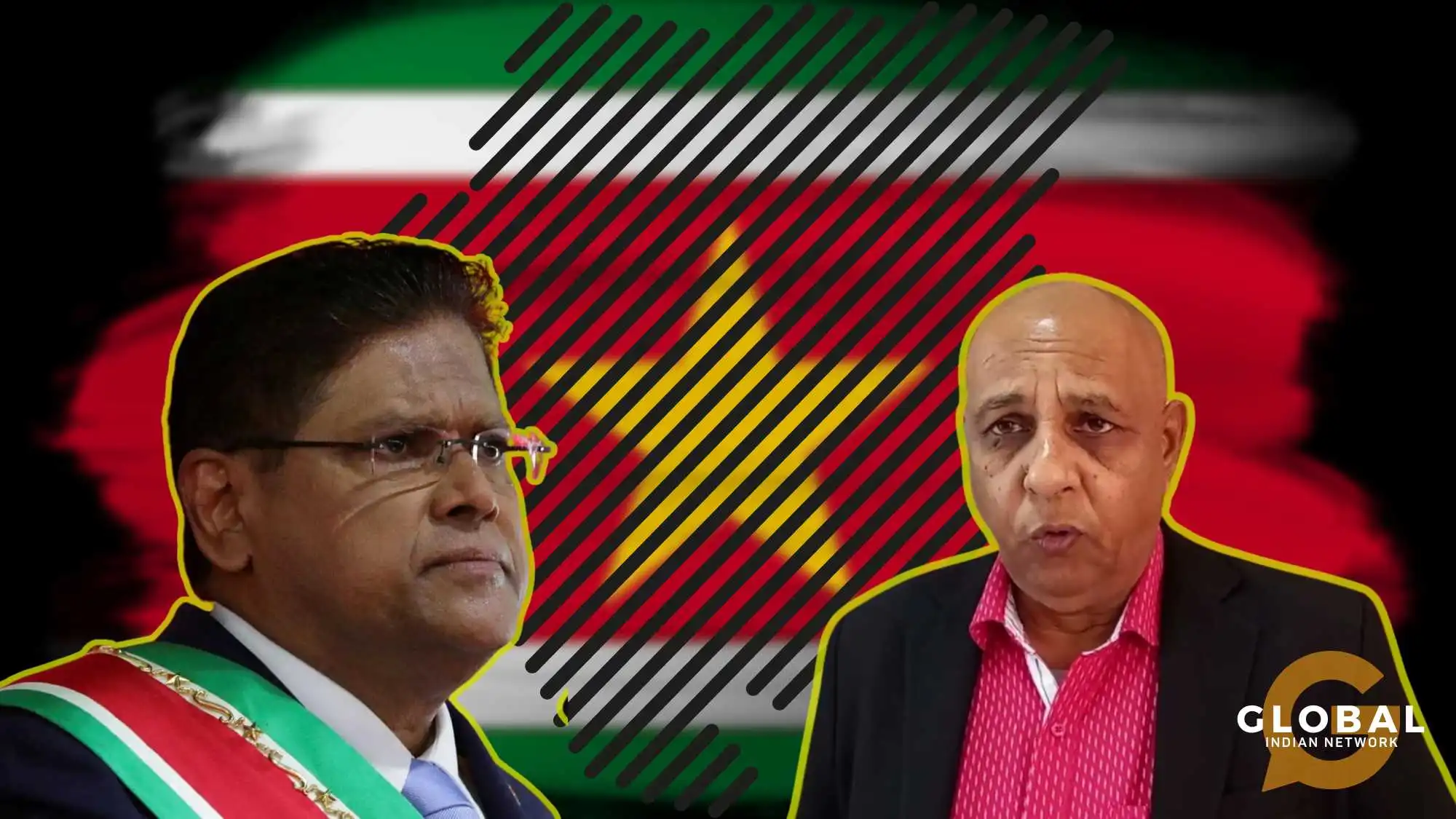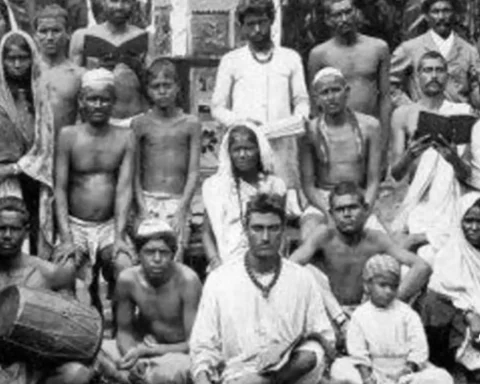Suriname, a small country on South America’s northeastern coast with a population of around 600,000, is ethnically diverse. Politically, it operates as a constitutional democracy with a president as head of state. Recently, on June 5, 2024, Suriname experienced public protests driven by economic struggles, high inflation, and corruption allegations. These protests have pressured the government, led by President Chandrikapersad Santokhi (The Sheriff), who is facing calls for transparency and reforms. The unrest highlights growing dissatisfaction with governance and economic policies.
This piece focuses on the stance of Pertap Bissumbhar, a presidential advisor.
Table of Contents
The Context
Presidential advisor Pertap Bissumbhar has urged dialogue between the government and protesters in Suriname over rising living costs and government policies. He focused on the need for collaborative solutions and reforms to correct decades of mismanagement by Desi Bouterse‘s previous leadership.
President Chandrikapersad Santokhi was elected president of Suriname in July 2020
Importance of Dialogue
Presidential advisor Pertap Bissumbhar highlights the importance of dialogue in addressing problems and finding solutions. He advocates for a collaborative approach to governance, encouraging open discussions between citizens and the government to address issues effectively and ensure the satisfaction of all parties involved.
Public Protests
Bissumbhar urges protesters against governmental policies to engage in dialogue instead of protesting. He acknowledges their right to protest but highlights the government’s offer to engage in discussions. The appeal aims to redirect tension towards a more constructive outcome, suggesting dialogue could lead to productive solutions for citizens’ grievances.

Economic Challenges
The advisor acknowledges the societal discontent caused by rising living costs and economic hardships, pointing out that these issues result from ongoing reforms to address long-standing issues. During Desi Bouterse’s tenure in Suriname, numerous protests have emerged due to public dissatisfaction with economic conditions, governance issues, and human rights violations. Bissumbhar amplifies the need for immediate correction to improve efficiency within state-owned enterprises.
Correction of Long-Standing Issues
Bissumbhar highlights the need for government reforms due to past mismanagement, particularly regarding exorbitant subsidies given to state utilities like the Electricity Company (EBS). He underscores the need to reduce these subsidies to restore the company’s viability and ensure effective operations without excessive government financial support.
Government Response to Protesters’ Demands
Bissumbhar clarified that claiming high electricity tariffs is a matter of analysis. He is currently investigating claims and seeking measures to improve efficiency. He urged the public to remain patient as these analyses and improvements unfold over the coming year.
Surinamese protest IMF-influenced increased electricity tariff, during Desi regime,May 2016
Environmental Commitments
In response to environmental concerns in July 2022, Bissumbhar has backed protestors’ demand for a general pardon for illegal logging, highlighting Suriname’s commitment to sustainable forestry practices and proactive approach to environmental conservation and governance. Bissumbhar supports withdrawing amnesty for illegal logging and opposes unethical land allocations to officials.
Ethical Governance
Bissumbhar supports President Santokhi’s view on land distribution, arguing that unethical practices benefit some individuals while others await equal opportunities. This stance draws attention to the importance of ethical governance and fair treatment within the state apparatus.
Awaiting Legal Outcomes
Bissumbhar advocates for due process in the case of alleged financial fraud at the Ministry of Finance, urging the results of ongoing criminal investigations before labeling individuals responsible. This demonstrates a commitment to justice.

Public Response
The public’s response to Pertap Bissumbhar’s call for dialogue has been mixed, reflecting skepticism and a willingness to engage. Key points of public sentiment include:
Interest in Dialogue: Some public members recognize dialogue as a crucial tool for addressing grievances and exploring potential solutions with the government, viewing it as a constructive engagement opportunity.
Skepticism About Government Actions: Protesters express concerns about the government’s sincerity and commitment to addressing their issues and doubts about the potential for substantial improvements in living conditions through dialogue.
Continued Protests: Protests persist despite dialogue calls, indicating strong individual demands and reluctance to back down until concrete actions are taken to address their grievances.
Demands for Accountability: Protesters demand accountability, particularly regarding economic measures and the government’s past management practices, expressing a desire for more than just discussions.
Desire for Immediate Action: Many citizens advocate for immediate, tangible solutions to pressing issues like rising living costs and inefficient public services rather than lengthy, unresolved discussions.
With the above status, one side of the stakeholders has spoken. The government must now take appropriate actions and actively address the issue.
The Road Ahead
The Suriname government is fulfilling economic reforms, welfare programs, and increased transparency to address public grievances, stabilize the economy, support disadvantaged communities, and ensure governance accountability.
Economic Reforms
Suriname is carrying out economic reforms to stabilize its economy following a crisis. These include reducing government subsidies for state-owned enterprises, effectively managing oil revenues, balancing budgets, and consolidating the exchange rate to ensure long-term sustainability and financial stability.

Social Welfare Programs
Targeted social welfare programs are being irealized to support low-income families and vulnerable populations. These include targeted subsidies for essential services, elderly support programs for retirement, food assistance through distributions and vouchers, healthcare access through subsidized or free healthcare, and job training and employment programs to improve employability. These initiatives aim to offset the costs of essential services, ensure adequate support for senior citizens, combat food insecurity, and enhance healthcare access for disadvantaged groups.
Legislative Changes
The government is implementing legislative reforms to improve human rights protection and anti-corruption measures. A draft law for a National Human Rights Institute is being reviewed to establish transparent and accountable institutions with financial independence and active participation from civil society and tribal groups.
Community Engagement Initiatives
The government is executing community engagement strategies to address grievances. These include capacity-building programs for farmers and local communities and stakeholder engagement for community participation in governance discussions. These initiatives empower them and ensure policies reflect public needs and aspirations.
Transparency and Accountability
The government is implementing strict anti-corruption measures to restore public trust, including mandatory asset declarations for public officials and establishing an Independent Anti-Corruption Commission. These measures aim to foster a culture of integrity.
Explore Our Archive of Surname-related Articles:
- Dilip Sardjoe: The Business Socialist Who Shaped Suriname’s Economy and Politics
- Celebrating Powerful Women of Suriname: Figures Who Are Making a Difference
- Strengthening Financial Integrity: The Santokhi Administration’s AML/CFT Initiatives in Suriname
- Overview of Suriname’s AML/CFT Measures and Key Findings
- How Globalization is Shaping Business Culture in Suriname
- AML/CFT in Suriname: Challenges Faced by Financial Intelligence and Investigative Systems under President Santokhi
Conclusion
Presidential Advisor Pertap Bissumbhar accentuates the need for dialogue to address the complexities of governance in Suriname, focusing on economic reforms, environmental responsibility, ethical governance, and handling public dissent. He suggests strategies such as comprehensive economic reforms, targeted social welfare initiatives, legislative changes for human rights protections, active community engagement, and enhanced transparency to foster a more equitable society and build trust between the government and its citizens. Encouraging constructive dialogue could lead to resolution and progress in the nation.
Presidential Advisor Pertap Bissumbhar has not provided an exact timeline for analysing high electricity tariffs or sharing the results with the public. However, he has urged the public to remain patient as analyses and improvements are expected to unfold over the coming year. This suggests the government is working towards providing insights and possible solutions within that timeframe. Citizens are encouraged to await further developments as the government prioritizes these evaluations amidst public discontent.
We hope that the Snaotkhi government will continue to pay attention to citizens’ concerns. In general, the question ’why’ is answered as actions are taken. Further allied questions on ‘when, where, and how’ should also be made clear to the public.
Remember a quote by American statesman, orator, and lawyer Henry Clay?
“Government is a trust, and the officers of the government are trustees, and both the trust and the trustees are created for the benefit of the people.”
Strong partnerships between various stakeholders help address complex challenges and create innovative solutions, ultimately leading to a more prosperous and resilient nation. With collective commitment, Suriname is set to shine in its own right in the coming years.











[…] a nation's destiny can change drastically. Suriname has such a story to tell. The government under President Santokhi is geared to exploring unchartered […]
[…] was placed on the FATF grey list, indicating deficiencies in its AML/CFT frameworks. However, under President Chandrikapersad Santokhi's leadership, Suriname has implemented significant reforms to address these issues, including […]